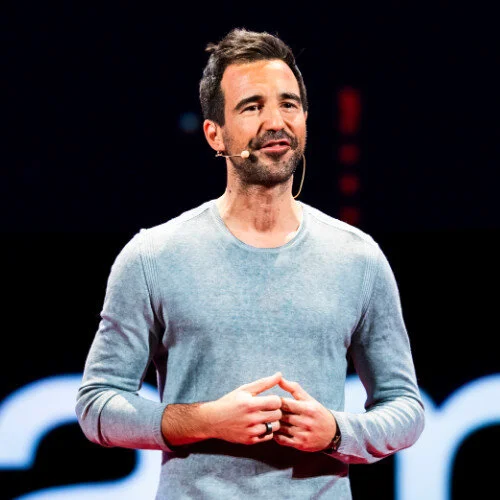Meet dr tomas chamorro-premuzic
“Confidence is not the same as competence.”
We were delighted to welcome Dr Tomas Chamorro Premuzic to last week’s Moving Ahead Gender Balance Summit. He urges the world to prioritise competence and asks for mentors to have “real moral courage” . . .
Dr Tomas Chamorro Premuzic is an organisational psychologist, chief talent scientist at manpower Group, and a professor at the University of College London and Columbia University. A frequent contributor to Forbes on the topic of leadership equality, he's also the author of 10 books, including Why Do So Many Incompetent Men Become Leaders (and How To Fix It), and his research, he says, “boils down to a very specific idea: that confidence is not the same as competence and the world needs to stop focusing on the former to focus more on the latter”.
Dr Tomas told the Gender Balance Summit that, in the course of his research, he has learned that “the factors that help people ascend an organisational hierarchy and get to the top aren’t factors that are actually needed to be an effective leader. This gap actually explains why most of the leaders we choose are not very effective.” Instead, we are seduced by things like overconfidence, and charisma – even narcissism. “Which is obviously quite counterproductive, when you're supposed to inspire others, and have beneficial effects on teams and organisations.”
Complicating matters further is the fact that even those trying to improve the gender balance in leadership, “are actually making things worse… blaming women for not behaving like overconfident men. They're saying you should lean in, even if you don't have the talent to back it up.” That they’re effectively being asked to speak more in meetings, even if they have nothing to say, or told to put themselves forward for jobs, even if they don't meet the requirements.
DOUBLE STANDARDS
However, as Dr Tomas says, due to double standards, “when women do behave in confident or assertive ways we’re put off by them, because they seem too masculine. So even if that advice actually worked, we would not end up with the right women in charge: we’d end up with a specific profile of female leader who resembles the majority of leaders we have in place today – incompetent men”. That the ‘Fake it until you make it’ culture actually perpetuates the unfairness and toxic forces that govern the dynamics in the existing systems. The conclusion of his research, then, is that if you want to make it easier for competent women to become leaders, “you should start by making it harder for incompetent men to get to the top”.
Nevertheless, he thinks the pandemic may have provided a silver lining: that many people have now come to the conclusion that the world is generally better off when led by people who are competent, rational, data-driven and smart. “By people who are kind, empathetic and considerate and who actually care about others, not just about themselves.”
His big hope, then, is that we revise our leadership models or flawed leadership archetypes. To ditch those deeply ingrained unconscious biases that make us favour the charismatic, the extroverted and the charming. And Tomas is optimistic that these biases aren’t quite as unconscious as we think. “They're actually strong cultural biases. So the call to action for anyone who is in a position to evaluate leadership potential in others is… to focus less on style and more on substance.” Leadership selection, he says, “should be more like blind tasting of wine. And that means emphasising the role that our intuition plays.”
FOCUS ON DELIVERY
We need to start focusing more on what people deliver – “which is counterintuitive, because we don't”. If leadership is now more complex than it was 20,000 years ago or 200,000 years ago, we still think we know ‘leadership potential’ when we see it. “There's a fabulous quote by Plato that says something along the lines of, ‘Only those who don't seek power should be allowed to have it.’ Which is the complete opposite of leaning in, blowing your own trumpet, branding yourself, and creating your digital reputation.” Leadership should be more about who has the qualities to make other people better. “It’s only then that we're going to improve the quality of our data, while simultaneously increasing the representation of women in leadership.”
Crucially, mentors, and those who are part of the status quo, need to show real moral courage. “It's a moral imperative, an ethical imperative. Anyone in a leadership role today should fight to make the system better and be doing their bit to sanitise and sterilise the corrupt rules and toxic dynamics that are making it very hard for people to get to the top when they should, and very easy for people to emerge as leaders or get to the top when they shouldn't.”
“When I talk about my research on gender leadership, the number one response that I get, especially from men, is ‘I think the best person should get the job regardless of whether they are a man or a woman’, to which I always answer, ‘Me too! I agree! Wouldn't that be nice!’ But that's not happening right now and until we realise that what we have in place is not a meritocracy, it's going to be very hard to drive any form of progress.”
His closing advice: “We need to develop expertise. Knowledge has become diluted or downgraded, in an age where information is so ubiquitous and prevalent that you can access it at any point. But developing true expertise and having the ability to evaluate competence, not just in others, but also in yourself, is the fundamental thing we can do to improve.”


